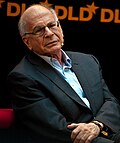Evidential decision theory (EDT) is a school of thought within decision theory which states that, when a rational agent is confronted with a set of possible...
9 KB (1,328 words) - 13:03, 5 March 2024
which causes the best outcome in expectation. CDT contrasts with evidential decision theory (EDT), which recommends the action which would be indicative of...
17 KB (2,222 words) - 13:01, 5 March 2024
Decision making Decision quality Emotional choice theory Evidential decision theory Functional decision theory Game theory Multi-criteria decision making Newcomb's...
29 KB (3,133 words) - 18:40, 18 July 2024
preference — than the more prominent decision theories, Causal Decision Theory (CDT) and Evidential Decision Theory (EDT). In general, CDT states that the...
21 KB (2,953 words) - 12:05, 12 April 2024
Newcomb's paradox (category Decision-making paradoxes)
its decision, making it impossible for the player's decision to affect the predictor's decision. Decision theory Causal decision theory Evidential decision...
18 KB (2,306 words) - 10:25, 15 April 2024
Theater, an activist and artist collective Evidential decision theory, a school of thought within decision theory Event-driven trading, institutional investors...
1 KB (159 words) - 20:45, 31 May 2022
In decision theory, the evidential reasoning approach (ER) is a generic evidence-based multi-criteria decision analysis (MCDA) approach for dealing with...
4 KB (502 words) - 11:25, 13 October 2022
structure "Evidential reason", a type of reason (argument) in contrast to an "explanatory reason" Evidential reasoning approach, in decision theory, an approach...
470 bytes (91 words) - 22:16, 16 July 2009
Similar to a decision matrix, a belief decision matrix is used to describe a multiple criteria decision analysis (MCDA) problem in the Evidential Reasoning...
5 KB (551 words) - 06:09, 22 December 2022
Superrationality (category Game theory)
the decision theory literature sparked by Newcomb's problem. Causal decision theory suggests that superrationality is irrational, while evidential decision...
11 KB (1,571 words) - 18:44, 10 July 2024
theory is a theory of behavioral economics, judgment and decision making that was developed by Daniel Kahneman and Amos Tversky in 1979. The theory was...
43 KB (6,046 words) - 07:53, 16 June 2024
Info-gap decision theory seeks to optimize robustness to failure under severe uncertainty, in particular applying sensitivity analysis of the stability...
129 KB (17,963 words) - 04:21, 18 March 2024
Preference Ranking Organization Method for Enrichment Evaluation (PROMETHEE) Evidential reasoning approach for MCDM under hybrid uncertainty There are significant...
11 KB (937 words) - 17:24, 19 March 2024
(1976). Mathematical Theory of Evidence. Princeton University Press. ISBN 0-691-08175-1. Yang J.B.; Xu D.L. (2002). "On the evidential reasoning algorithm...
3 KB (241 words) - 01:22, 19 February 2024
decision making (both in daily life and in settings such as business, government and medicine). It is also known as multiple attribute utility theory...
48 KB (5,802 words) - 04:46, 16 July 2024
responding to the Supreme Court's decisions that had resulted in the re-segregation of schools. The concept of standpoint theory became particularly relevant...
116 KB (13,182 words) - 18:58, 2 July 2024
Architecturally evident coding styles and code reviews that focus on architectural concerns and decisions are two related practices. Architectural decisions also...
14 KB (1,757 words) - 17:45, 5 July 2024
Evidence, Decision and Causality (Cambridge University Press, 2014), which defends evidential decision theory and critiques causal decision theory. Ahmed...
8 KB (584 words) - 14:04, 26 June 2024
formulation of the great man theory was Herbert Spencer, who believed that attributing historical events to the decisions of individuals was an unscientific...
22 KB (2,762 words) - 22:13, 19 June 2024
Set theory is the branch of mathematical logic that studies sets, which can be informally described as collections of objects. Although objects of any...
41 KB (5,021 words) - 12:35, 2 July 2024
Chaos theory is an interdisciplinary area of scientific study and branch of mathematics. It focuses on underlying patterns and deterministic laws of dynamical...
121 KB (13,819 words) - 23:25, 6 July 2024
Bayesian probability (redirect from Bayesian probability theory)
assigned a probability. Bayesian probability belongs to the category of evidential probabilities; to evaluate the probability of a hypothesis, the Bayesian...
33 KB (3,413 words) - 14:48, 5 July 2024
Cognitive dissonance (redirect from Cognitive dissonance theory)
experimental study about self-awareness in status-seeking behavior". Theory and Decision. 79 (3): 493–515. doi:10.1007/s11238-014-9469-5. hdl:10419/70167...
116 KB (14,197 words) - 04:57, 22 July 2024
Color theory, or more specifically traditional color theory, is the historical body of knowledge describing the behavior of colors, namely in color mixing...
29 KB (3,915 words) - 19:05, 17 July 2024
The theory of belief functions, also referred to as evidence theory or Dempster–Shafer theory (DST), is a general framework for reasoning with uncertainty...
36 KB (4,962 words) - 03:04, 26 January 2024
Influence diagram (redirect from Decision diagram)
Pearl, J. (1985). Bayesian Networks: A Model of Self-Activated Memory for Evidential Reasoning (UCLA Technical Report CSD-850017). Proceedings of the Seventh...
12 KB (1,476 words) - 13:54, 8 June 2024
In information theory, the entropy of a random variable is the average level of "information", "surprise", or "uncertainty" inherent to the variable's...
69 KB (9,894 words) - 10:43, 14 July 2024
Problem of evil (redirect from Logical and evidential arguments from evil)
generally formulated in two forms: the logical problem of evil and the evidential problem of evil. The logical form of the argument tries to show a logical...
140 KB (17,672 words) - 18:59, 16 July 2024
Mindset (redirect from Mindset theory)
since the 1990s. Gollwitzer's contributions include his theory of mindset and the mindset theory of action phases. A political example is the "Cold War...
37 KB (4,509 words) - 21:48, 10 June 2024










